Welcome to TRANSCEND INTERNATIONAL
We are a Peace Development Environment Network. Our aim is to bring about a
more peaceful world by using action, education/training, dissemination and
research.
Solutions-Oriented Peace Journalism
Transcend Media Service (TMS) is our platform for exclusive analysis,
research and policy comment on local and global affairs. Since 2008 we published
more than 18.000 articles providing our own Peace Journalism Perspective plus a
digest of the week’s relevant news – in various languages.
Our current weekly digest is available at transcend.org/tms.
Also make sure to subscribe here.
About us
Our Mission Statement
TRANSCEND has as its mission: To bring about a more
peaceful world by using action, education/training, dissemination and
research to transform conflicts nonviolently, with empathy and creativity,
for acceptable and sustainable outcomes.
- By peace we mean the capacity to transform conflicts with empathy, without violence, and creatively - a never-ending process;
- By transforming conflicts we mean enabling the parties to go ahead in a self-reliant, acceptable and sustainable manner;
- By without violence we mean that this process should avoid any cultural violence that justifies direct or structural violence;
- By with empathy we mean the ability also to understand the conflict the way the parties understand the conflict themselves;
- By creatively we mean channelling conflict energy toward new realities, accommodating the parties and meeting basic human needs.
THEORY
- Violence: Insulting basic needs by actor intent or structure operating
- Basic Human Needs: Survival-Wellness-Freedom-Options-Identity-Meaning
- Peace:
- Negative: No violent relations
- Positive: Equity-Empathy relations
- Development: Reducing inequality – Lifting the bottom up
- Environment: Increasing diversity – Increasing symbiosis
PRACTICE
- Peace: Solving underlying conflicts – Conciling underlying traumas
- Development: Building cooperatives – Guaranteed Basic Income
- Environment: Less depletion-pollution – More diversity-symbiosis
This Theory/Practice presupposes insight in Deep Culture Deep Structure Deep Nature
TRANSCEND INTERNATIONAL was
founded August 1993 by Johan Galtung and Fumiko Nishimura as a conflict
mediation organization. Dietrich Fischer, the former director of
TRANSCEND University Press, joined soon after and in June 1995 Dietrich
Fischer and Johan Galtung invited 11 others. By now TRANSCEND has more than 400
scholars-practitioners from more than 60 countries as members. For more details, please read "A brief history of TRANSCEND" by Dietrich Fischer.
TRANSCEND International is a timely
experiment in promoting peace by peaceful means throughout the world.
Traditionally, institutes have been centered around a building where the people
who work together meet on a regular basis. Since many people who share common
interests in helping transform conflicts nonviolently and creatively are
geographically scattered and cannot usually be physically together, our solution
was to create an electronic network of members, which, in addition, to
diminishing our carbon-footprints and contribute to attenuate the global warming
crisis has allowed TRANSCEND INTERNATIONAL to connect autonomous individuals and
academic and research centers from all over the world with a focus on peace by
peaceful means, development by developmental means and environment by
eco-consistent means.
More concretely, TRANSCEND practices mediation and peace-building around the
world, with Manuals, a Code of Conduct, and Perspectives with diagnosis,
prognosis and therapy for conflicts (see: 50 Years-100 Peace & Conflict
Perspectives, TRANSCEND University Press, 2008).
Our mission-statement defines four pillars on which our ongoing work builds
in order to bring about a more peaceful world. These are 1:action,
2:education/training, 3:dissemination and 4:research.
- TRANSCEND Peace University-TPU (www.transcend.org/tpu),
for government and non-government practitioners and students at any
level, with 12-week bi-semester on-line courses, and intensive TPU
on-site training programs in several locations around the world (see
announcements at the TPU website);
- TRANSCEND University Press-TUP (www.transcend.org/tup),
which publishes high quality books and textbooks about peace by
peaceful means, development by developmental means, and environment by
environmental means;
- TRANSCEND Research Institute-TRI (www.transcend.org/tri), which publishes research papers and booklets for free downloading;
- TRANSCEND Peace Service-TPS, which offers
mediation, conciliation and peace-building services by TRANSCEND
members, and is open to anybody around the world with conflict and peace
concerns and experiences; and
- TRANSCEND Media Service-TMS (www.transcend.org/tms), a Peace Journalism resource for journalists/media, professionals, students and the Internet public at large.
It is on this basis, that our members strive to handle conflicts with
constructive empathy, concrete non-violent means and creativity for
mutually beneficial outcomes. [see our code of conduct for more details]
Notwithstanding the fact that for each of these four pillars, TRANSCEND
has a designated body, the cornerstone of our daily work is the
incessant interaction between these bodies.
A GENERAL PHILOSOPHY UNDERLIES OUR 13 PROGRAMS:
1. Peaceful Conflict Transformation
2. Peace-Building
3. Nonviolence
4. Reconciliation
5. Peace Education
6. Peace Journalism
7. Peace Business
8. Peace Systems
9. Peace and Gender
10. Peace and the Arts
11. Peaceful Foreign Policies
12. Peace Departments/Ministries
13. UN People's Assembly
Board of TRANSCEND International – Executive Committee (alphabetical order all):
Inner Circle:
Antonio C. S. Rosa, Editor TRANSCEND Media Service
Erika Degortes, Manager TRANSCEND Peace University (and for Southern Europe)
Johan Galtung, Manager TRANSCEND University Press, Rector TRANSCEND Peace University
Malvin Gattinger, Manager TRANSCEND digital, Webmaster
Naakow Grant-Hayford, Manager G-I Galtung Institut system (in German)
Outer Circle:
Fernando Montiel T. for Judicial Mediation (and for Latin America)
Kyoko Okumoto for Reconciliation (and for East Asia)
Marilyn Langlois and Diane Perlman, for Mediation (and for North America, West and East)
SP Udayakumar for Nonviolent Action (and for South Asia)
Synove Faldalen for Sabona (and for Northern Europe)
Conveners of Countries with Projects:
Arab World:
Abbas Aroua – Mediation Human Rights Peace Studies
Argentina:
Sara Horowitz – University Mediation Courses
Bulgaria:
Stephan E. Nikolov – Eastern Europe in Transition
Cambodia:
Emma Leslie – Timor-Leste, Myanmar, Sri Lanka
Cameroon:
Célestin Tagou, Protestant University of Central Africa – Translations
of Galtung & SABONA to French. Johan member, scientific committee
PUCA doctorate school
New Zealand:
Joanna Santa-Barbara – Sustainable Settlements
PR of China:
Jason G. Tower – World & Regional Harmony Transition
DRC-Democratic Republic of Congo:
Rais Neza Boneza – Peace by African’s Peaceful Means + PEP 2: People Empowerment Process/Peace Empowerment Process (leadership initiatives)
El Salvador:
Adrian Bergmann – Chair, MA program in Violence Prevention and Peace
Culture Universidad Don Bosco. Cátedra de Cultura de Paz, Instituto
Centroamericano para la Paz
Georgia:
Irakli Kakabadze – Caucasus Equity Autonomy
Germany:
Joachim Engel – Intercultures
Ghana:
Naakow Grant-Hayford – Permaculture Africa
India:
S. P. Udayakumar – End to nuclear power/energy/weapons
Italy:
Erika Degortes – Peace & Politics Workshops
Japan:
Kyoko Okumoto – Reconciliation NE Asia
Olivier Urbain – Arts, particularly music
R of Korea:
Jae-Bong Lee – Korean Unification, University Courses
Mexico:
Fernando Montiel T – Judicial mediation, TPU Spanish, Latin America
Nepal:
Bishnu Pathak – Nepal process, Federalism
Norway:
Synöve Faldalen – SABONA=TRANSCEND in Daily Life
Hardanger Academy Peace Dev Env Jondal
Philippines:
Cesar H. Villanueva – Class & Nation Conflict ASEAN
Russia-CIS:
Olga Vorkunova – CIS particularly Caucasus General Theory
United States:
Diane Perlman – East Coast
Marilyn Langlois – West Coast, Haiti

TRANSCEND Media Service
We invite you to subscribe:
TRANSCEND Media Service - TMS is an online editorial updated weekly. It fulfills
the three functions of Action, Education/Training, Dissemination and is a medium
for our members to practice peace journalism and deliver solution oriented news
and analyses in written or video format. TMS is both a service to other media
and a medium in its own right. You are most welcome to use all the material
presented - no copyright, no fees - but attribution would be appreciated. Watch
Prof. Galtung explain TMS.
For weekly updates and analysis on international news including Prof.
Galtung's weekly editorial please click the link below:
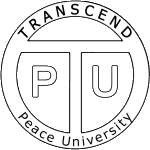
TRANSCEND Peace University
Apply and enroll here:
The TRANSCEND Online Peace University or TPU offers two 12-week on-line
courses every year. These courses are addressed to anyone interested in peace
and development, whether beginner or seasoned practitioner, including NGO
members, diplomats, politicians, government officials, international civil
servants, students, teachers, journalists, social workers, entrepreneurs,
lawyers, officers, psychologists, artists.
Yes: Our courses are adequate for students with varying degrees of experience.
Get in touch with tpu-admin@transcend.org
for specific considerations pertaining to your profile. In order to find out
more details about application formalities, about the online course in general
or the different subjects and paradigmes that make up the course, please click
on the link below:
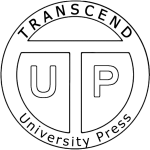
TRANSCEND University Press
Peruse and order our Books here:
TRANSCEND University Press or TUP publishes high quality books and textbooks
about peace by peaceful means, development by developmental means, and
environment by environmental means. The first set of books are the 15 books
written by Prof. Galtung partly in co-authorship with reputed academics such as:
Prof. Paul D. Scott from the University of Sydney, Prof. Graeme
McQueen from the Mc Master University of Ontario and Prof. Fred Dubee
from the Beijing Genomics Institute. All these books systematically outline the
scope and investigate the depth of peace studies through the trademark
transdisciplinary epistemological approach that TRANSCEND University Press
advocates.
The books available can all be ordered directly from our current list of
publications, please click on the link below:
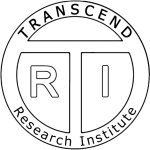
TRANSCEND Research Institute
The TRANSCEND Research Institute or TRI pursues four objectives and delivers four services:
Objectives
- To produce and disseminate high quality solution-oriented reseach on peace, development and environment.
- To generate, document and disseminate new knowledge, theory and
insights relevant to peace, development and environmental work.
- To link theory, action and reflection to contribute to the further development of the field.
- To promote peace research among practitioners, and provide
grounding in the theoretical, conceptual and empirical foundations of
research methods.
Services:
- Do Thesis/dissertation supervision.
- Undertake research projects for NGOs, INGOs, civil society organizations, public sector, religious organizations.
- Store and share refreed papers/essays collected under individual researchers, topics etc.
- Facilitate key search.
Contact tri@transcend.org with concrete inquiries or visit:
First things first: It is important to note, that one becomes an
official member of TRANSCEND International only by invitation through
the board of convenors. This being said, there are many ways of joining
TRANSCEND International's efforts.
Now: Why Join our efforts?
Because you know that peace is not everything, but everything around
us amounts to naught without it. So what is peace?
Because you share with us the need to know in intimate and systematic
detail which are the means available to our species to improve our societies and
living conditions in such a way that they allow for more equitable and mutually
beneficial interaction in the domestic as well as in the international arena.
But how?
Because you have an inkling or have done your homework and already
know for a fact, that the current dominant cultural, political, military,
economic and academic paradigmes are ecologically inconsistent, highly
inadequate for nonviolent conflict resolution and interculturally incompetent
due — among other things — to inbuilt singularisms. So what can "I"
do about it?
Because you have the energy and the desire to use your brain to serve
the dissemination of structure literacy, conflict literacy and nonviolent
conflict resolution.
Contribute to TRANSCEND International
Dear Supporter-Subscriber-Reader-Viewer-Student-Analyst-Friend,
thank you for supporting our efforts with previous donations. We remain most
grateful for all the donations that have come our way with no strings attached.
Please rest assured, that we are committed to employing your donations in the
most conscientious way we can. Again: Thank you.
TRANSCEND International was founded in 1993 and has launched a peace service
with mediation-conciliation and resolution services in more than 100 conflicts
up to this day; has developped a research institute, an online university, a
university-press in two, soon four languages; as well as a weekly media service.
All of this was achieved without any outside funding, earning our way through
workshops and publications.
Especially because outside funding from State or Capital may come with
strings attached to often intransparent vested interests, we highly value
donations from likeminded international citizens. Allow us to appeal to your
trust as we continue to put all contribution to good use for our wide range of
activities that can be summed up as: solutions-oriented peace-work. If you would like to support us with a donation, there are two ways:
Thank you!
Beyond monetary donations, we welcome many forms of contribution to our work. In particular you may wish to:
Yours sincerely,
TRANSCEND International
TRANSCEND Peace Channel
The TRANSCEND Peace Channel or TPC, is a recent dimension of TRANSCEND
International's effort towards serving the public at large with analytical views
informed by peace-, conflict- and structure-literacy. Currently planned are
regular comments by our regional experts on World issues, the situation
Afghanistan-Iraq-East Asia; Southeast Asia; Latin
America; the Arab World, as well as Africa. This is an
important step towards strengthening the dissemination of solution-oriented
journalism.
Contact tpc@transcend.org to share a
story idea or submit specific topics you want our experts to elaborate on.
Support Peace Literacy
Support our work concretely, creatively and constructively: Join the
Transcend Peace Service
Join the Transcend Peace Service and support our work. You can contribute
intellectually, financially, symbolically, journalistically, artistically,
collectively, or individually. which ever way you choose: We encourage you to do
it systematically and passionately. Either by writing constructive solution
oriented articles and proposing them to our media service TMS, by acquiring our
books and learning to think about what peace is and disseminating your insights,
or by taking TPU-courses on our digital campus. We offer various avenues to
learn more about peace. Prof. Galtung is unequivocally recognized as the
principal mind that fostered the creation of the academic discipline of Peace
Studies in 1957.
Join our educational effort
By enrolling in our online
university you can learn from the best in the field about the foundations,
conditions, mechanisms and potentials of concrete, creative, and constructive
conflict transformation and positive peace. Join one or several of our various
courses we offer through our online university and become more knowledgable
about the structural and cultural underpinnings of our current international
system and how these underpinnings influence our business choices, our
understanding of economics, of legitimate violence and warfare, of democratic
principles, of journalism, tourism or terrorism for that matter.
Join our dissemination effort
You are invited to join our efforts towards creating a world more
knowledgeable about solution oriented conflict analysis and conflict
transformation.
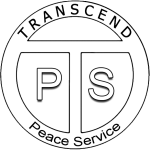
TRANSCEND Peace Service
TPS offers discrete assistance to anybody in the world with latent
or acute conflict concerns and peace needs. We assist in generating mutually
beneficial solutions for every conflict we get to work on. TPS offers free of
charge service in conflict resolution. For concrete questions, please contact us
with an email elaborating your concerns. We will serve you as best we can.
Contact TPS:tps@transcend.org
Beyond that, TRANSCEND Peace Service (TPS) invokes all members and visitors
to share their constructive, creative and concrete experiences in
peace-building, mediation and conciliation at their convenience.
Too bad ...
The page you requested could not be found :( Current ProgrammesPOSITIVE PEACE.
Increasing fulfillment through cooperation, harmony and fusion, peace
building, development, structural peace, cultural peace and
spirituality.
Key contact: Johan Galtung galtung@transcend.org
SABONA (Zulu for "I see You")
is TRANSCEND in daily life--schools, couples and family, at work--to
help people understand what happens in conflicts, how conflicts can be
solved and better relations be built. From experimental schools in
Norway the program is now expanding.
Key contact: Synove Faldalen synove.faldalen@lyse.net
GENERALS FOR PEACE.
During the Cold War Generals and Admirals for Peace voiced military
arguments against the type of warfare contemplated. The same is needed
today.
Key contact: Emma Leslie emma@online.com.kh
CONFLICT SENSITIVE DEVELOPMENT.
Based on deep knowledge of Sri Lanka, the Institute for Integrative
Conflict Transformation and Peace-building (IICP) in Vienna was asked to
design a conflict sensitive development program--beyond
reconstruction--in one Sinhalese, one Tamil and one Muslim village, as
well as a joint peace resource center, after the 2004 tsunami.
Key contact: Gudrun Kramer kramer@iicp.at
THE ARAB WORLD.
22 countries and more than 300 million, with numerous key conflicts within and without call for the use of
- Action: conflict transformation for Iraq, Somalia, and others
- Research: a Conflict Atlas for the Arab world, human rights
- Dissemination: peace journalism, also translated into Arabic
- Education: TRANSCEND Peace University, courses in Arabic
Key contact: Abbas Aroua abbas@aroua.com
MIDDLE EAST.
The Israeli/Palestinian conflict has so far defied interventions.
TRANSFORM (The Interdisciplinary Centre for Conflict Analysis, Political
Development and World Society Research) is currently building a network
of Facilitators for Peace in the Middle East and is developing a
methodology for Social Transformation in Conflict. It is also
disseminating TRANSCEND's approach of pursuing peace by peaceful means.
Key contacts: Ahmed Badawi and Ofer Zalzberg info@transform-centre.org
AFRICA.
More than 50 countries and 500 nations call for creative use of peace
resources in deep cultures and structures, giving nations prominence in
federations and opening up in communities, with focus on the baraza and
other peace resources.
Key contact: Rais Boneza rais.boneza@gmail.com
(NORTH-)EAST ASIA.
The problem facing a (North-)East Asian region with China and Taiwan,
the two Koreas and Japan--cooperating with Russia Far East--is Japan,
often referred to as the US 51st state. On the other hand, the Shanghai
Cooperation Organization includes Central and South Asia. Creative
reconciliation and new approaches are needed.
Key contact: Kyoko Okumoto okumoto@wilmina.ac.jp
THE INVISIBLE CONTINENT.
The state system and inter-governmental organizations, playing their
often lethal games, are highly visible; less so the millions of human
generally living peaceful lives, facing deep conflicts, performing
miracles of conflict transformation and peace building. Stories pass
from generation to generation and groups to groups through griots, to be
made more visible.
Key contacts: Naakow Grant-Hayford and Karoline Weber peaceservice@transcend.org
FROM STATE FOREIGN POLICIES TO GLOBAL DOMESTIC POLITICS.
The state system is yielding to regionalization and globalization. State
foreign policies can no longer be based on (dominant) nation interests
only but have to be aligned with regional and nature-human-global
interests. The program calls for joint efforts in many states, like
Ministries for Peace, solutions for inter-regional conflicts, and global
visions for Weltinnenpolitik.
Key contacts:
Johan Galtung galtung@transcend.org and George Kent kent@hawaii.eduTRANSCEND Art and Peace Network
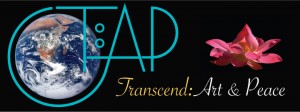
We believe that the creative spirit within all human beings can transcend
the forces of contradiction and conflict and that people can achieve peaceful
conflict transformation and peacebuilding at the personal, local, and global
levels. Music and the arts can play a major role in inspiring people towards the
enhancement of more peace and justice in our societies.
The goal of this website is to encourage virtual and actual collaboration
between people of all cultures, civilizations and backgrounds, concerning
research into the power of the arts for peacebuilding.
Members
More information about individual TRANSCEND members is not public at this moment. Still, we provide this chart which shows where our members are from:

| 